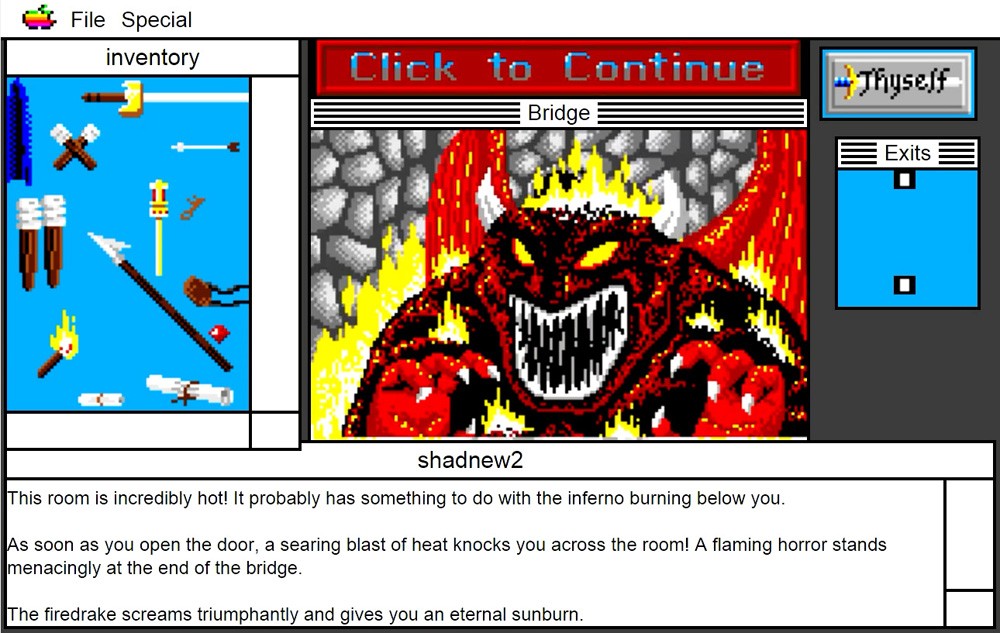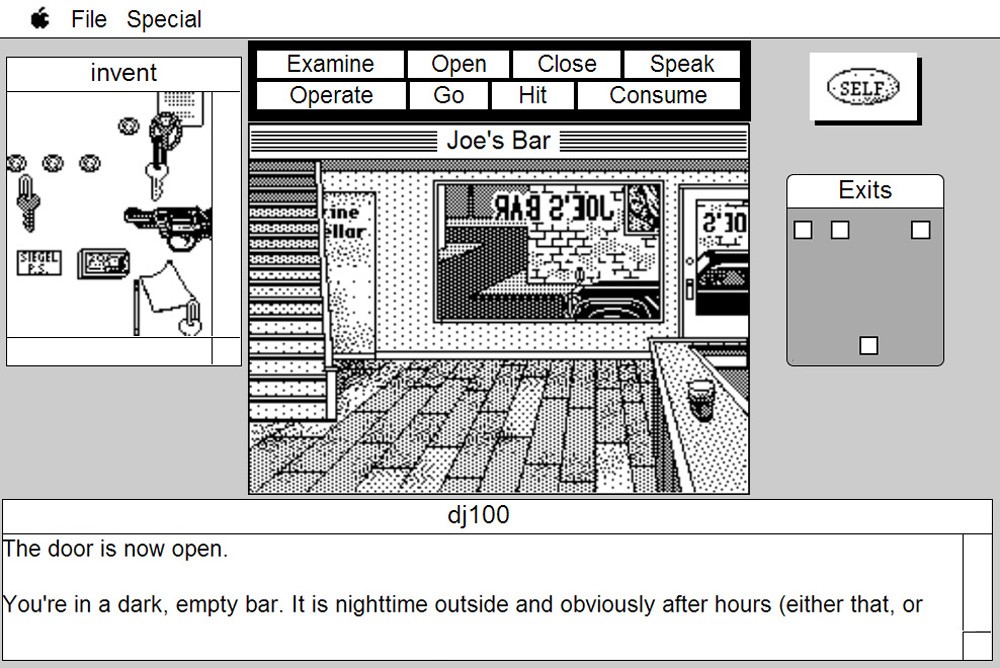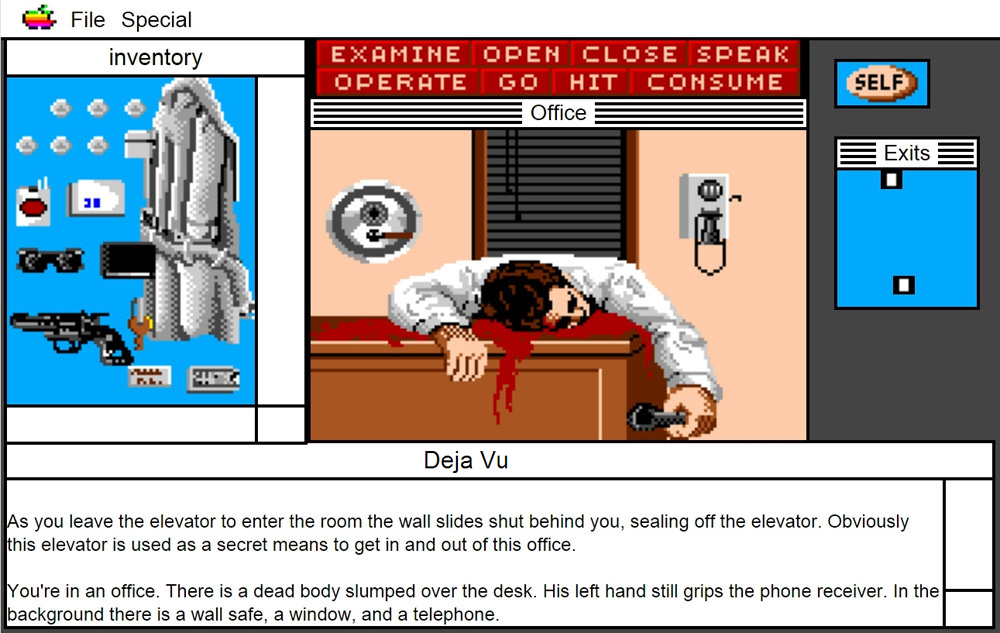Jul 04, 2019 Great games for your nongaming laptop. Want to sneak in a little PC gaming on the side? Here's how to find the best games for almost any school or office laptop. Dec 17, 2010 The Japanese version suffers from a bit less censorship – the Game Over screen is a creepy skull with the words “Rest in Peace” below it, closer to the original Mac version, and the dead guy in the bar is soaked in blood, where he is clean in the NES version. The seltzer is also now ramune soda.
Retro game collections allow players to experience classic games on modern platforms, often with welcome enhancements. 8-bit Adventure Anthology collects three classic NES/Mac point-and-click games: Shadowgate, Uninvited, and Déjà Vu, in a simple package. You'd be hard-pressed to find a better example of adventure game history on Xbox One!

NES and Mac classics resurrected
Back in 1985, ICOM Simulations developed a point-and-click adventure game engine for Apple Macintosh called MacVenture. This engine would power Déjà Vu (1985), Uninvited (1986), Shadowgate (1987), and Déjà Vu II: Lost in Las Vegas (1988). Shadowgate would go on to receive a handful of sequels using a different game engine and even a full Steam remake in 2014. All of these games would be ported to the NES from 1987-1991, receiving numerous game design tweaks, new soundtracks, and upgraded color graphics.
Now Abstraction Games has packaged the NES versions of Déjà Vu, Uninvited, and Shadowgate into 8-bit Adventure Anthology: Volume One for modern consoles and PC. Oddly, Déjà Vu II is not included. Perhaps it will make the cut in the second volume, although I wonder what the other games will be since only four MacVenture games were made. If you prefer to play the original Mac versions of these games (though they're worse in many respects), Reverb Triple XP sells them in a $6.99 bundle on Steam.
Engine and enhancements

From the 8-bit Adventure Anthology main menu, players can select between the three included games. There is no historical information, description, or even release date info for any of these games – definitely a weak point of the collection. Sure, this title appeals mostly to people who played the originals, but short write-ups to establish some context for an old games collection would be cheap and easy.
All three games in this anthology share the same game engines. They feature a primary view window, with everything rendered in a generally strong pixel art style. To the right is an inventory window, at the bottom is a navigation window (you can also navigate from the primary window), and at bottom center, a menu with eight interaction options. Each game offers a lot of puzzles to challenge players. It's even possible to die by making poor choices. Thankfully, you can (and should) save anywhere.
Although the 8-bit Adventure Anthology skimps on presentation, it does at least offer some good visual options for playing these venerable 8-bit games. All three games were originally created in a 4:3 full-screen ratio, but you get four choices for scaling the display here. Each game displays its own specific border that matches the 8-bit look of that game. You can also enable four different filters for TV-style effects. The lack of a flat-screen black-and-white filter is surprising, given that the actual Mac games strictly ran in black and white.
Control-wise, the left stick and D-Pad both move the cursor at an annoyingly slow speed. There really should be an option to hold the triggers to move the cursor faster. Still, hitting the View/Back button at least quickly toggles the cursor between the various windows. All of these games worked fine with a controller on the NES, and they still do now – though I imagine the Steam version's proper mouse support feels nicer than the console game's slow cursor.

Shadowgate
In Shadowgate, you play as the last man in a line of kings. You've been tasked with entering a dark warlock's castle and stopping him from raising a behemoth that will destroy the world. The castle is filled with all manner of traps and monsters, including a shark-infested lake (which you'll need to freeze in order to cross), a hall of coffins filled with deadly slime, a vicious wolf disguised as a damsel in distress, and more. You'll have to read scrolls to acquire several spells needed to progress, and finally, assemble the ultimate weapon to stop the warlock.
Shadowgate is the only game in this collection to incorporate a slight timed element in the form of torch management. You'll find and collect numerous torches throughout the adventure. These must be lit, after which they will eventually burn out. Should both of your torches burn out at once, you'll die instantly. Thankfully, the music changes to indicate that a torch is almost used up, so always keeping one lit shouldn't be a problem.
Uninvited
Whereas Shadowgate features a fantasy horror theme, Uninvited is a pure horror game set in modern times. In this one, you wake up in the driver's seat of a wrecked car.
After escaping from the car, it explodes, leaving you stranded in front of a mansion. Your sister is missing, too. Could she be trapped inside? You'll encounter a variety of ghastly ghosts and monsters as you search for her.
Déjà Vu
Déjà Vu: A Nightmare Comes True was the first MacVenture title, and the only one to receive a sequel from the original developers. It takes place in Chicago in 1941 and features a hardboiled detective noir theme.
The detective protagonist awakens in a bathroom stall at a bar, apparently having been drugged by ne'er-do-wells. Having lost his memory, our hero must investigate the murder of a bar patron and prove his own innocence along the way. He'll have to find an antidote for the drug that took his memory as well.
Overall impression
Classic gaming collections serve a valuable purpose, preserving old games and making them available to new audiences. 8-Bit Adventure Anthology: Volume 1 is a fine collection of historically important point-and-click adventures that might otherwise be forgotten over time. All three games are challenging but playable, and you can always consult a guide if you get stuck. It's not the fanciest collection, but you'll get plenty of puzzles, intrigue, and nostalgia here for a very low price.
Pros:
- Three classic adventure games for only eight bucks or less.
- Each game features memorable pixel art, simple but intriguing stories, and lots of challenging puzzles.
- Decent visual options let you customize the look, though the default view is probably best.
Cons:
- No historical info or descriptions for the individual games.
- The cursor moves too slowly on consoles and lacks a speed-up button.
- Music emulation glitches in Uninvited upon entering the room with the southern belle ghost.
8-Bit Adventure Anthology: Volume One costs $7.99 on Xbox One, PlayStation 4, and Steam. During launch week, it'll be on sale for only $6.95. Get it while it's hot, adventure fans!
Xbox One review copy provided by the publisher.
We may earn a commission for purchases using our links. Learn more.
Slow it downWindows 10 preview build 19041.207 hits Slow ring with handful of fixes
Microsoft pushed another Windows 10 preview build out to Slow ring Insiders today. Like recent updates to the Slow ring, this one is a cumulative update that focuses solely on delivering a handful of fixes.
Taking a completely different approach is Kemco-Seika's Deja Vu, which is based on a compu ter game by Icom Simulations. Kemco-Seika also released the popular Shadow-gate for NES, and Deja Vu is played almost exactly the same way. An on-screen window shows a picture of what your character sees while you select your actions from a menu of commands. Deja Vu is 'role-playing' in the strictest sense, because you play a single characr ter in what is essentially an interactive story.
The setting is Chicago in the 1930s, when gangsters were running wild. At the beginning of the game, your character wakes up - in a restroom stall, of all places - and you can't even remember who you are. There's a needle mark on your arm, and you feel as if you've been drugged. It seems obvious that your lack of memory is the result of foul play, not cheap gin, but who's responsible? If you were that much trouble, why didn't they just kill you? And just who are you in the first place?
Deja Vu has a definite storyline. Little by little, you figure out not only who you are, but also who left you in this sorry state and why. It's a classic RPG - as you move through the game, you find the right item that leads you to the next piece of the puzzle.
Actually, this game is so structured that you can't progress unless you find all the clues. When you get stuck, it's usually because you're looking for something that's small and easily missed, or because you haven't figured out the right way to get the item using the game's commands.
The story in the NES version is very similar to that of the PC version, although it has been adapted slightly to fit Kemco-Seika's player interface. The game has colorful graphics and a good sense of humor, and it's not very difficult. Because the route you have to take from clue to clue is so rigidly defined - A leads to B leads to C - all you have to do is find the right item. Deja Vu is thoroughly enjoyable, but RPG veterans will probably find it little more than a snack.